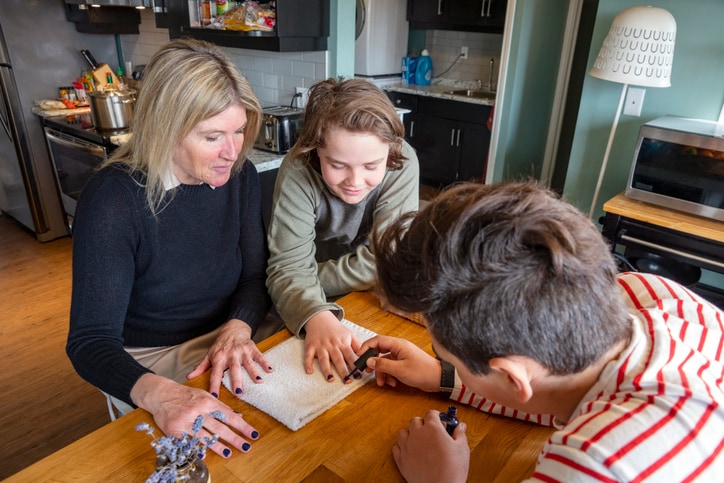When mom of two Anam Khan, of Glenview, Illinois, hired her first live-in child care provider, she was excited and optimistic to welcome her as a new part of their family. However, it soon became apparent that the familial aspect of the relationship was starting to overshadow the importance of the employee/employer relationship.
“I went out of my way to make her feel comfortable and like family,” says Khan. “Unfortunately, it worked a little too well. She started oversharing and wanting to spend more time chatting rather than working.”
It’s human nature to want to be liked and form meaningful relationships. On top of that, relationships with our child care providers are different from other professional relationships because they involve very personal things: our children. Let’s also not forget that we often invite child care providers into our homes, where all of our flaws and family dynamics can be on full display. So when boundaries may blur between you and your nanny, it shouldn’t come with great surprise.
While it can be OK to have a friendship within a working relationship with your child care provider, at the end of the day you are still the employer, meaning you must balance being professional and, if you choose, personal. With this in mind, here are five ways to maintain professionalism, even if it does get personal at times.
1. Align expectations
Before choosing child care, decide what type of relationship will work best for your family and how personal you would like to be with your child’s caregivers. There’s a stark difference in the relationships you form if you hire a live-in nanny or au pair, who is supposed to be considered more like member of the family, versus choosing an early learning center run by a team of providers.
Kayla Mallory, a nanny from Atlanta, Georgia, suggests asking would-be employees what it means for them to be a nanny.
“Ask them to describe the best family they ever worked for and why,” she says. “This will tell you a lot about what worked for them.”
She credits the early established, mutual understanding of what it means to be a child care provider with the great relationship she has with her current family.
2. Respect the profession
No matter the child care you choose, it is imperative to trust that person’s role as a provider for your children above any personal relationships. Maureen Clifford, a mom of three from Woodbridge, Virginia, and executive director at NOVA Montessori, an organization that provides child development resources for families to use in their home, advises parents “respect their child care provider as a professional with the experience and expertise just as you would your doctor or hairstylist.”
If you view your child care provider as a friend first, it may affect how you absorb their feedback. This means, Clifford says, “we can miss important developmental issues or avoid other situations that need to be addressed frankly.”
Clifford has had to counsel both teachers and parents on this dynamic. She saw a sticky situation arise when a preschool teacher babysat for a student off hours. This, according to Clifford, altered the parents’ professional view of that teacher and led them to dismiss the teacher’s later concerns about the student “because [the parents say] ‘she only knows about that behavior because she babysits for us.’”
Clifford also observed instances where teachers were afraid to tell parents about issues or concerns because of their personal friendships.
3. Acknowledge power dynamics
The power dynamics that exist between employee and employers are different from those between friends. So what do we do when we are both friend and employer? According to Kelly Diels, a feminist marketing consultant from Vancouver, B.C., Canada, these friendships with a professional component mean that we have to be willing to engage in tough and honest conversations.
“We’re both boss and friend, so we have to explicitly grapple with and talk about the power differential in one role while navigating the equality in the other role,” Diels says.
Diels advises framing conversations around these roles rather than ignoring them. She suggests saying things like:
- “OK, I’m putting my employee hat on: It makes it hard to do my job when you show up late.”
- “Putting on my boss hat for a moment: I need for you to spend more time encouraging Sophie to eat her lunch.”
- “I worry that telling you what’s going on in my marriage or finances will make you question our working relationship.”
4. Honor boundaries
You might bring work home with you. Your child care provider shouldn’t. For nanny Mallory, setting boundaries with the family she works for has been a key part of success.
“They completely understand my wishes that after work with them, my time is mine and my husband’s,” Mallory says.
Angel Makaro, a nanny from Pitt Meadows, B.C., Canada, agrees.
“I refrain from oversharing,” she says. “I keep my private life private. And if a subject comes up that I am not comfortable discussing, I usually try to change [it]. Oh, and I don’t accept friend requests on Facebook from my [nanny families].”
Clifford, who oversees several Montessori schools, agrees, directing parents who want to socialize and chat to set up a time to speak later.
“We also discourage our staff from socializing with parents outside of school, friending them on social media, attending student birthday parties or other milestone celebrations,” she says.
Diels, who has five children, approaches her relationships by asking herself if she intends to keep the relationship after the caregiver is no longer taking care of her children.
“If the answer is no, I keep things professional… friendly, but professional,” she says. “We’re not hanging out. We’re not going places together. We don’t tell each other intimate secrets. That way, boundaries don’t get blurred.”
For Khan, it was blurred boundaries that led to the demise of her relationship with her child care provider, who started treating child-related work tasks as optional and complained when Khan asked her to do them. She also crossed the line with personal conversation such as “commenting on anything I ate while trying to diet, saying that my kids liked her more, or not wanting to do something for my child and telling me to do it instead,” says Khan.
5. Put your child first
Above all, the relationship you have with your child’s provider is secondary to the relationship your child has with his/her provider and the care your child receives.
“Whether or not the parent and caregiver become BFFs is not relevant to the child’s development,” says Clifford, who urges parents to “honor the professional boundary between parent and caregiver” and instead look for meaningful relationships with actual family members and friends.
When Khan realized the boundaries of her relationship with her child care provider were being crossed and were putting her and her family in an uncomfortable situation, she tried to work it out by communicating directly. But it was too late and they went their separate ways, she says.
“We had to have a serious talk, but she felt the situation was too uncomfortable for her and there were too many restrictions now,” Khan says.
Moving ahead, Khan intends to not share too many personal details about herself with her child care provider and intends to set clear expectations and roles from the beginning.
“Have rules and expectations from the beginning and make it clear what would happen if those expectations aren’t met,” she says. “You can have a good relationship without getting too close.”






